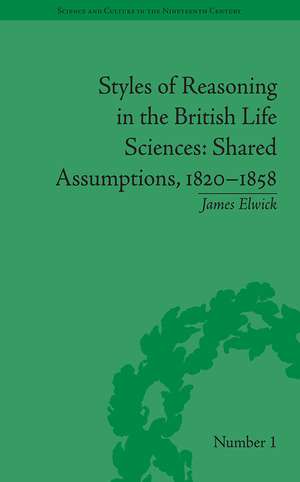Styles of Reasoning in the British Life Sciences: Shared Assumptions, 1820–1858: Sci & Culture in the Nineteenth Century
Autor James Elwicken Limba Engleză Paperback – 2 apr 2021
Elwick explores how the concept of "compound individuality" brought together life scientists working in pre-Darwinian London. Scientists conducting research in comparative anatomy, physiology, cellular microscopy, embryology and the neurosciences repeatedly stated that plants and animals were compounds of smaller independent units. Discussion of a "bodily economy" was widespread. But by 1860, the most flamboyant discussions of compound individuality had come to an end in Britain. Elwick relates the growth and decline of questions about compound individuality to wider nineteenth-century debates about research standards and causality. He uses specific technical case studies to address overarching themes of reason and scientific method.
Din seria Sci & Culture in the Nineteenth Century
-
 Preț: 428.75 lei
Preț: 428.75 lei -
 Preț: 426.79 lei
Preț: 426.79 lei -
 Preț: 428.75 lei
Preț: 428.75 lei -
 Preț: 351.61 lei
Preț: 351.61 lei -
 Preț: 427.39 lei
Preț: 427.39 lei -
 Preț: 502.82 lei
Preț: 502.82 lei - 17%
 Preț: 376.95 lei
Preț: 376.95 lei -
 Preț: 395.54 lei
Preț: 395.54 lei -
 Preț: 434.30 lei
Preț: 434.30 lei -
 Preț: 463.08 lei
Preț: 463.08 lei -
 Preț: 427.77 lei
Preț: 427.77 lei -
 Preț: 392.44 lei
Preț: 392.44 lei -
 Preț: 356.73 lei
Preț: 356.73 lei -
 Preț: 431.62 lei
Preț: 431.62 lei -
 Preț: 432.57 lei
Preț: 432.57 lei -
 Preț: 464.44 lei
Preț: 464.44 lei -
 Preț: 333.49 lei
Preț: 333.49 lei -
 Preț: 229.85 lei
Preț: 229.85 lei -
 Preț: 469.61 lei
Preț: 469.61 lei -
 Preț: 426.79 lei
Preț: 426.79 lei -
 Preț: 501.85 lei
Preț: 501.85 lei -
 Preț: 392.66 lei
Preț: 392.66 lei -
 Preț: 387.82 lei
Preț: 387.82 lei -
 Preț: 391.67 lei
Preț: 391.67 lei -
 Preț: 384.92 lei
Preț: 384.92 lei -
 Preț: 451.71 lei
Preț: 451.71 lei -
 Preț: 384.54 lei
Preț: 384.54 lei -
 Preț: 386.45 lei
Preț: 386.45 lei -
 Preț: 386.88 lei
Preț: 386.88 lei -
 Preț: 419.88 lei
Preț: 419.88 lei -
 Preț: 426.25 lei
Preț: 426.25 lei -
 Preț: 298.59 lei
Preț: 298.59 lei -
 Preț: 388.41 lei
Preț: 388.41 lei -
 Preț: 422.97 lei
Preț: 422.97 lei -
 Preț: 385.53 lei
Preț: 385.53 lei -
 Preț: 422.38 lei
Preț: 422.38 lei -
 Preț: 290.52 lei
Preț: 290.52 lei -
 Preț: 390.14 lei
Preț: 390.14 lei -
 Preț: 385.91 lei
Preț: 385.91 lei -
 Preț: 305.33 lei
Preț: 305.33 lei -
 Preț: 422.97 lei
Preț: 422.97 lei -
 Preț: 225.53 lei
Preț: 225.53 lei
Preț: 385.91 lei
Nou
Puncte Express: 579
Preț estimativ în valută:
73.84€ • 77.31$ • 61.10£
73.84€ • 77.31$ • 61.10£
Carte tipărită la comandă
Livrare economică 05-19 aprilie
Preluare comenzi: 021 569.72.76
Specificații
ISBN-13: 9780822966340
ISBN-10: 0822966344
Pagini: 248
Greutate: 0.36 kg
Ediția:1
Editura: University of Pittsburgh Press
Colecția University of Pittsburgh Press
Seria Sci & Culture in the Nineteenth Century
ISBN-10: 0822966344
Pagini: 248
Greutate: 0.36 kg
Ediția:1
Editura: University of Pittsburgh Press
Colecția University of Pittsburgh Press
Seria Sci & Culture in the Nineteenth Century
Recenzii
"A stimulating and highly original book."
—History and Philosophy of the Life Sciences
—History and Philosophy of the Life Sciences
"Elwick has provided an informative and constructive analysis of the major themes involved."
—Isis
—Isis
"Elwick's book is a valuable contribution to a richer historical understanding of the period. The quality and range of the research is exemplary and I found myself wanting more of his well-written and lucid arguments."
—British Society for Literature and Science
—British Society for Literature and Science
"An important book."
—British Society for the History of Science
—British Society for the History of Science
"I learned a great deal from Elwick’s book about matters relevant, not just to my interest in the history of the period in question, but also to issues still at stake in contemporary philosophy of biology. Historians and philosophers of biology alike have much to gain from reading it."
—Journal of the History of Biology
